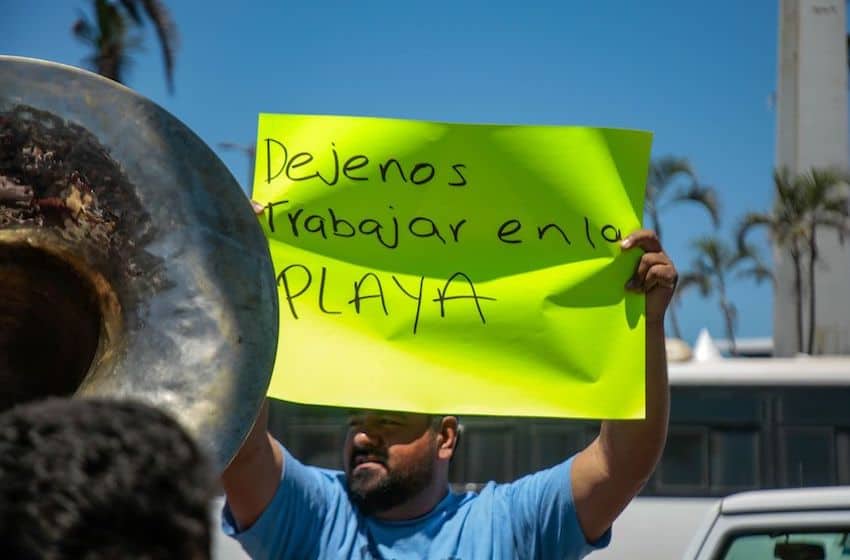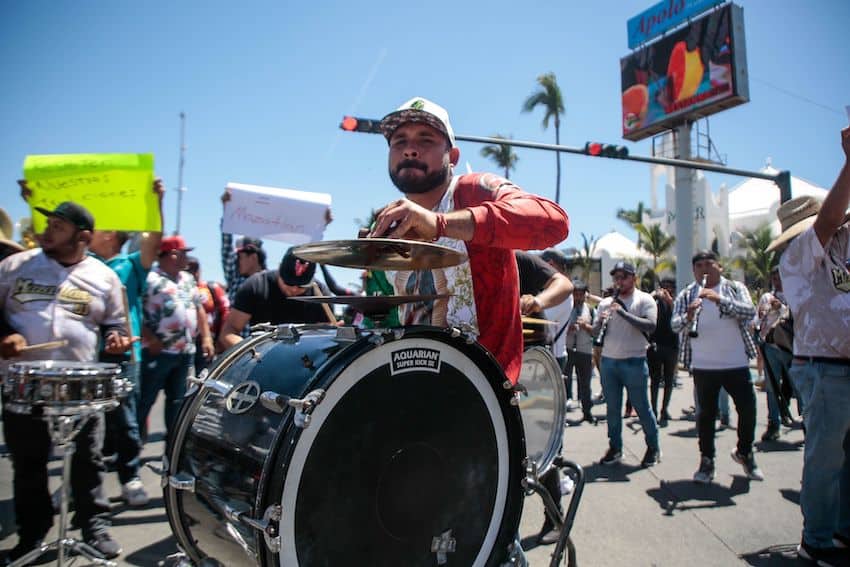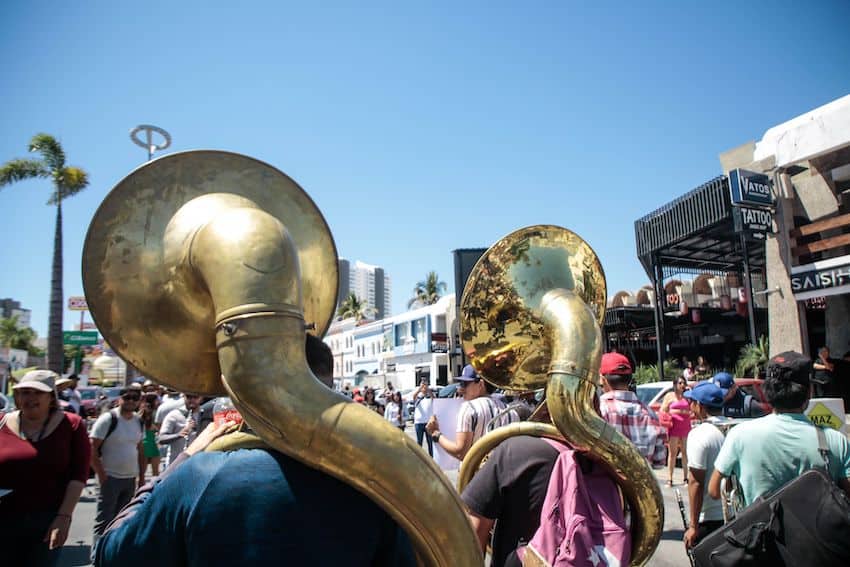The battle over banda music heats up on the beaches of Mazatlán

A group of foreign tourists are enjoying an acoustic guitar performance on the terrace of a seafront hotel in Mazatlán when their experience is abruptly interrupted by a very different genre of music — banda sinaloense, to be exact — emanating from the nearby beach.
A video of the event — as well as a photo of a sign at a luxury condominium banning the hiring of musical groups on the beach in front of the building — recently triggered an online, and offline, debate between people who support the right of banda musicians to play loudly and proudly on the beaches of Mazatlán and those who would like the city’s playas to be more peaceful places.
The beaches of Mazatlan, Sinaloa, México are known for live groups that play “Banda” music. Now gentrification pushed by hotel owners, business men & politicians have made an “anti-noise” coalition to prohibit live music on the beach, largely to appeal to influx of 🇨🇦tourists. pic.twitter.com/zbbR8wCZGz
— Andalalucha (@Andalalucha) March 26, 2024
Gentrification, the importance of preserving traditional Mexican music and the “welcomeness,” or otherwise, of foreign tourists in Mexico have all formed part of the debate.
Meanwhile, on the ground in Mazatlán this Semana Santa (Holy Week), there was a protest by banda musicians concerned about measures they believe are aimed at silencing them, which was met with reassurance from the mayor that live music will not be banned on the city’s popular beaches.
Despite the absence of any move by authorities to prohibit musicians from plying their coastal trade, the banda brouhaha has attracted widespread attention in the Mexican media this week. Let’s take a deeper look.
First things first. What is banda sinaloense?
According to the newspaper Debate, “banda sinaloense, also known as tambora sinaloense, is a musical genre that has defined the cultural identity of Mexico, especially in the state of Sinaloa.”
“With deep roots in the 19th century, this musical style has experienced a significant evolution, combining European, Caribbean, United States and Indigenous influences to create a distinctive sound.”
The website Musicalyst notes that banda sinaloense is “a brass-based genre that combines traditional Mexican music with European polka rhythms.”
“The music is characterized by its upbeat tempo, strong brass section, and the use of clarinets, trumpets and trombones. Banda sinaloense is often played at celebrations such as weddings, quinceañeras [fifteenth birthday celebrations] and fiestas” — and at the beach in Mazatlán.
There have been complaints about the presence of banda musicians on Mazatlán’s beaches for years, but the issue hasn’t previously blown up quite as much as it has this week.
The debate over whether banda should be allowed on Mazatlán’s beaches
Writing on the X social media platform above footage of the interruption of the acoustic guitar performance, Mexico-based United States journalist Andalusia K. Soloff noted that “the beaches of Mazatlán … are known for live groups that play banda music.”
“Now gentrification pushed by hotel owners, business men & politicians have made an ‘anti-noise’ coalition to prohibit live music on the beach, largely to appeal to [an] influx of Canadian tourists,” she wrote.
“It’s their country and traditions. Don’t take that away from them,” read one response to her post.
“Ban live music? What?” said another X user.

Another social media user took a very different view, exclaiming: “Hallelujah. I wish they would do the same over here on the [Baja] peninsula. Pinche [damn] Mexicans and their obnoxiously loud music.”
One of the most prominent voices in the ongoing debate has been Ernesto Coppel, a hotel owner, television personality and native of Mazatlán. He suggested that tourists from the United States, rather than Canada, are the most frequent complainers about banda music on Mazatlán’s beaches.
“We cannot allow this racket of cacophonous noise for even one moment more” Coppel says at the beginning of a video message, referring to loud music all over the city including on public transport.
Loud music is “causing tremendous damage to the city,” he asserts, adding that the banda groups that play on Mazatlán’s beaches are a “scandal” and a “disaster.”
“They don’t allow people to rest. I have a lot of complaints from hundreds of American tourists who tell me, ‘I’m not coming back to Mazatlán because of the racket,’” Coppel says, claiming that they have developed a view of the city as a chafa (bad or cheap) tourism destination.
“We’re all making the effort to invest billions of dollars per year in Mazatlán, in resorts, in hotels, in aquariums, in everything. We urgently need to control the noise. We’re not a fifth-class destination, we’re a first-class destination and that’s how we should see ourselves,” the hotelier continues.
“Enough is enough. … We have to legislate, we have to control this, cut this out. Things can’t remain like this,” concludes Coppel, a leader of the Alianza Antirruido en Mazatlán, or Mazatlán Anti-Noise Alliance, which is made up of at least 20 hoteliers and apartment building owners, some of whom have made similar remarks.
“So because of the gringos we’re going to change the way our brothers from Mazatlán are?” said one social media user in response to Coppel’s video.
“Sinaloa is naturally noisy, but it’s beautiful that way. That’s its charm,” the person added.
#NotiTreceMX en #Mazatlán prohiben la Música de Banda, que porque dicen molestan a los turistas… hubo una manifestación que se salió de control.
los detalles a las 10:30pm
13.1 Tv abierta / 113 Megacable
13 izzi & Totalplay pic.twitter.com/3ICULTbzRb— RAMIRO ESCOTO DIGITAL (RED) (@Ramiro_Escoto) March 28, 2024
Another social media user complained about the presence of United States tourists in the Sinaloa resort city.
“I’ve just returned from Mazatlán. How awful! It’s full of slovenly gringos. But CHOCK-A-BLOCK. I’m from Sinaloa and I’ve traveled to Maza my whole life, but never had I seen so many gringos. The worst thing is that they speak to you in English as if they were in the United States. How sad,” the person wrote.
Another social media user asserted that “gringos love Mexico” but “without Mexicans and without modern Mexican culture.”
“Mazatlán is literally known as the cradle of banda sinaloense,” the person added.
On social media and in the streets of Mazatlán, “gentrification is being spoken about,” the newspaper Reforma reported, “because preference is being given to people from outside the port, mainly foreign tourists, who have complained about the ‘noise.’”
Of course, not all Americans, or foreign tourists more broadly, dislike banda music. In fact, a number of foreigners in Mazatlán who recently spoke to Mexico News Daily said that they love the genre, with some even choosing to live in or visit the city in order to enjoy banda on a regular basis.
Musicians take to the streets of Mazatlán to play — and protest
A large group of musicians protested on Wednesday against “measures that seek to silence banda music on the beaches of the port” of Mazatlán, the newspaper Reforma reported.

Miguel Rubio, a member of a band that regularly plays on local beaches, told Reforma that he wasn’t against authorities limiting the hours in which musical groups can play. However, he rejected any move to ban them outright.
If a band is playing on the beach at three in the morning, “one can understand it is annoying for tourists,” he said.
However, “Mazatlán is the land of the bandas,” Rubio said, insinuating that visitors need to understand that.
Samuel Ramírez, another musician, stressed that his livelihood and that of his fellow band members is dependent on being able to play on the beaches of Mazatlán.
“That’s how we get the daily sustenance for our families,” he said.
In addition to their instruments, protesting musicians carried signs with messages such as “We are hungry, we have family, yes to music!” and “the beach is free.”
While the musicians were protesting peacefully — albeit while playing their instruments — municipal police suppressed the demonstration, Reforma reported.
With “yanks” and “blows,” the officers tried to “silence the instruments,” the newspaper said.

The newspaper El Financiero reported that a fight between police and musicians broke out when officers tried to arrest one protester.
The response of Mazatlán authorities
After a meeting between local authorities, hoteliers and musicians late last week, the Mazatlán municipal government announced that musical groups had agreed to not play on beaches before 11 a.m. and after 7 p.m. The government also said that only 15 two-person ensembles and 12 larger bandas would be given permits to play in certain areas of certain beaches.
However, Mayor Edgar González Zatarain said Thursday that municipal authorities had issued 56 permits and also given musicians identity cards. He said that permits had been granted to 38 bandas and 18 norteño groups.
The mayor also said that local authorities have always supported banda sinaloense musicians, and acknowledged the contribution they make to the identity of Mazatlán and the city’s culture.
In a radio interview on Thursday, González stressed that municipal authorities hadn’t imposed restrictions on the times bands can play on the beach, highlighting that the musicians themselves had agreed to limit their hours. “There is no established schedule,” he said.
Banda sinaloense has seemingly been played on the beaches of Mazatlán forever — and will continue to entertain (or annoy) beachgoers for a long time to come, including over this Easter weekend when large numbers of tourists and locals will descend on the so-called Pearl of the Pacific.
If you like the beach, but don’t like banda, Mazatlán — to say the least — is probably not the place for you. As one local musician put it, playing banda is a “tradition” in the city, and most certainly not a crime.
With reports from Infobae, Excélsior, Reforma, El Financiero, El Universal and MVS Noticias
Source: Mexico News Daily

